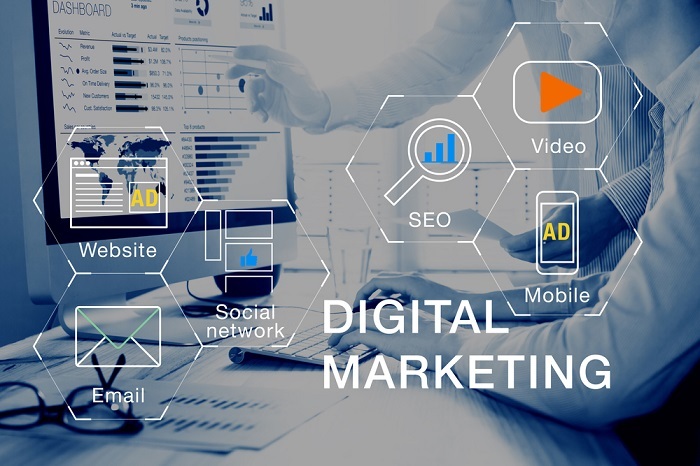
 Data Structure
Data Structure Networking
Networking RDBMS
RDBMS Operating System
Operating System Java
Java MS Excel
MS Excel iOS
iOS HTML
HTML CSS
CSS Android
Android Python
Python C Programming
C Programming C++
C++ C#
C# MongoDB
MongoDB MySQL
MySQL Javascript
Javascript PHP
PHP
- Selected Reading
- UPSC IAS Exams Notes
- Developer's Best Practices
- Questions and Answers
- Effective Resume Writing
- HR Interview Questions
- Computer Glossary
- Who is Who
What Do You Think Will Be the Biggest Focus in Digital Marketing?
In today's digital age, businesses must stay on top of the latest trends in digital marketing to remain competitive. The ever-changing nature of technology and consumer behavior makes it challenging to predict the future of digital marketing. Nevertheless, as new technologies emerge and consumer habits shift, certain key areas will likely dominate the digital marketing landscape in the coming years. Now, let's explore what digital marketing entails.

What Exactly is Digital Marketing?
Digital marketing is a marketing approach that utilizes digital technologies to connect and interact with customers. It encompasses various channels and strategies, such as social media marketing, email marketing, search engine optimization (SEO), content marketing, and pay-per-click (PPC) advertising.
The goal of digital marketing is to connect with customers where they are spending the majority of their time - online. It means that digital marketing strategies must be designed to engage customers across various digital platforms, including social media, search engines, email, and mobile devices.
Digital marketing offers businesses numerous advantages, with one of its primary benefits being the ability to gather a wealth of data and insights about customers. Through digital marketing, companies can track how customers interact with their digital channels, such as websites and social media profiles. Now, let's delve into the most significant focus areas in digital marketing.

Setting Your Sights: How to Achieve Digital Marketing Goals
Digital marketing has become essential for businesses of all sizes to connect with customers and grow their brands online. However, setting clear and specific goals is crucial to achieving success in the digital landscape. In this article, we'll explore what digital marketers are saying about plans, how to set more granular goals, achieve those goals, measure success, and when to revisit your digital marketing goals.
What Are Digital Marketers Saying?
According to a recent study, the most common digital marketing goals include increasing website traffic, generating leads, and improving brand awareness. However, it's crucial to set goals that are specific, measurable, achievable, relevant, and time-bound (SMART). As an illustration, instead of merely devising a plan to boost website traffic, establish a specific goal to increase website traffic by 20% within the next three months through targeted SEO optimization and strategic social media advertising.
What About More Granular Digital Marketing Goals?
In addition to broader goals, it's essential to set more granular goals for specific digital marketing channels. For example, if your goal is to generate leads, plan the number of charges you want to develop through each channel, such as social media, email marketing, or paid advertising. This approach allows you to track and measure the effectiveness of each channel separately.
Achieving Digital Marketing Goals
Once you have set your digital marketing goals, it's time to focus on achieving them. Start by creating a detailed action plan that outlines the steps required to meet your goals. Be sure to assign responsibilities, set deadlines, and track progress.
Measuring Your Goals
Regularly measuring success is crucial in determining whether you have achieved your digital marketing objectives. To track progress, use analytics tools to monitor website traffic, engagement levels, lead generation, and conversion rates. By leveraging this data, you can refine your strategy and optimize campaigns for better results.
How Often Should You Revisit Digital Marketing Goals?
Digital marketing is ever-changing, so you must revisit your goals regularly. At a minimum, review your goals quarterly to assess progress and make any necessary adjustments. However, revisiting your goals more frequently may be required if you notice a significant shift in your industry or consumer behavior.
Setting clear and specific digital marketing goals is critical to achieving success in the digital landscape. Use the SMART framework to create detailed, measurable, achievable, relevant, and time-bound goals. Let's now have a look at some of the challenges in Digital marketing.
The Other Side: Digital Marketing Challenges
In today's business landscape, digital marketing has emerged as a critical component of success. However, despite its advantages, digital marketing has its challenges. Digital marketers encounter internal and external obstacles that can hinder their ability to attain their objectives. In this article, we'll explore some of the most common challenges in digital marketing and the best strategies for overcoming them.
Staying Up-to-Date with the Latest Trends
Keeping pace with the latest trends and technologies in the realm of digital marketing is a perpetual challenge. This fast-moving industry is in a constant state of evolution, and staying abreast of the latest developments can be a daunting task.
Finding and Retaining Top Talent
Digital marketing requires various skills, from content creation and social media management to data analysis and SEO. Finding and retaining top talent with the necessary digital marketing skills can be a significant challenge, particularly in a competitive job market.
Scaling Digital Marketing Efforts
As your business grows, you must scale your digital marketing efforts to reach a larger audience. It can be a significant challenge, mainly when working with limited resources. Develop a comprehensive strategy to scale your digital marketing efforts that prioritizes your most significant growth opportunities.
Innovating and Staying Ahead of the Competition
The digital marketing landscape is highly competitive, and staying ahead can be a significant challenge. Success in digital marketing requires an unyielding commitment to innovation and a tireless search for new ways to stand out in an increasingly crowded marketplace. To stay ahead of the competition, focus on developing a unique brand voice and identity, and prioritize creativity and innovation in your marketing efforts.
External Challenges
Finally, various external factors can impact your digital marketing efforts, from changes in consumer behavior and industry regulations to emerging technologies and global events. To overcome external challenges, it's essential to stay informed and be prepared to adapt your strategy as necessary.
Digital marketing can be an advantageous and effective way to reach and engage with your target audience. Overcoming these digital marketing challenges helps you to boost your self-confidence. Let's now have a look at some final thoughts.
Conclusion
By deep understanding your target audience and their needs, preferences, and behaviors, you can create targeted and personalized marketing campaigns that are more likely to resonate and drive conversions. And by continuing to prioritize the customer throughout your digital marketing efforts, you can build stronger relationships, foster loyalty, and ultimately drive long-term business growth. You can learn to add new skills to your profile from Tutorials Point digital marketing courses.

